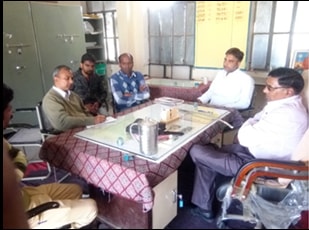
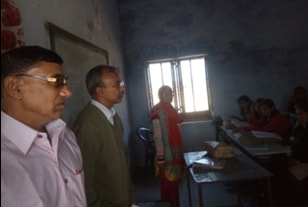
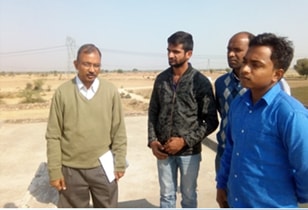
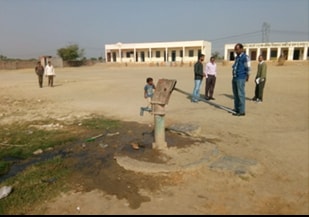
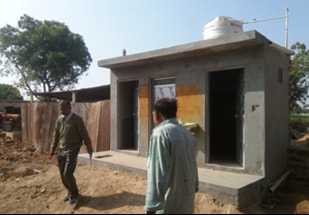





Team of faculty members and students visited Tamariya village on 17.01.18 (9:30 am - 1:30 pm). Prof. A.B.Gupta, Dr. Subbaramaiya, undersigned (Faculty members), Sh. Ashok and Sh. Ashutosh (students) met with Sh.Sharma ji (Principal, Adarsh Senior Secondary School), Sh. Giriraj Ji (secretary to BDO) and Sh. Hansraj ji (village helper) in the school premises. We took note of village population, drinking water resources, fuel used in kitchens, toilets in school and village houses and their utilization etc. through a quick round of the village, which began with discussions with the Principal of a senior secondary school being run in the village. He was highly motivated for the development works for the school and personally showed us the school premises, library, class rooms, laboratory, toilets, rooftop (school building) etc. and sent Mr. Hansraj with us to visit nearby places to see the toilets constructed under Swatchh Bharat Abhiyan, kitchen of one household, Bhairon temple, a pond which gets substantial water during rains, and Bandi river at village site. One interesting thing which came into knowledge while visiting a villager's house who was also beneficiary of Ujjwala Yojana that most of the villagers still use wood to prepare chapattis instead of LPG, but they use LPG for all other purposes. They had a good sense of hygiene as their toilets were clean and the wood lit stoves were outside the confines of the kitchen walls, where adequate dispersion was available.
During this visit we explored some measures that can be taken up in order to have a meaningful change in village life as detailed below:
1) To put a computer system (with Internet connection) in the library to have search facility and to upkeep records. This can also be utilized for hands on experience for the students, till they get their computer lab established. There were serious concerns of theft in the computer lab and hence the administration was not equipping this lab.
2) We discussed with the students about their urge for higher studies and tried to motivate them to join college in the adjoining village rather than dropping out from education. If they get constant information through internet usage, even if limited with one or two terminals in the library, they may feel curious about higher studies.
3) To channelize water accumulated near drinking water source (Hand pump/well) of school in to a wetland system so that not only ponding would be avoided, but also a green patch would be created.
4) To install RO plant (clean drinking water) at Bhairo temple, which is right opposite to the school premises. This temple is visited by all villagers twice daily and an equal number of people from the surrounding villages (and even from Jaipur city) visit the temple daily. Thus, a good demand for water exists and as per a recent drive by GOR, RO plants have been provided in thousands of villages. We can approach some organizations for meeting the capital cost of such a plant under their CSR funds. The RO reject would be sent to a tank in the school premises, which can be used for flushing the toilets and feeding the wetland system to ensure sustainability.
5) To harvest rooftop rain water for sanitation and wetland development.
6) To prepare digital elevation map of village to mark general slopes and drainage pattern, which can help select a site for an Uncut across the Bandi River. This can help store some water and at the same time recharge the GW table for a possible extra crop to be grown in the village. There was a severe stress observed this year as rains were scanty and since the local soil has a low permeability, the recharge of GW is very low. The uncut may be built with the help of line department of GOR.
7) To design and place dustbins (using waste materials) along road side and especially for the sites like Bhairon Temple, where visitors come frequently.
8) To channelize community grey water for its utilization and thereby avoiding any ponding on the roads especially where a cluster of houses exists.
9) To provide Briquette making machines for villagers to make use of wood, agro crop waste, and animal dung in a more efficient manner. After returning a meeting was held in which apart from the team members, Dr. Urmila Bhrigu and Dr. Mahesh Jat also participated and everyone discussed the overall problem and promised to help in developing a comprehensive Development Plan for Tamariya village.
Prof. A.B.Gupta
Dr. Pawan Kalla